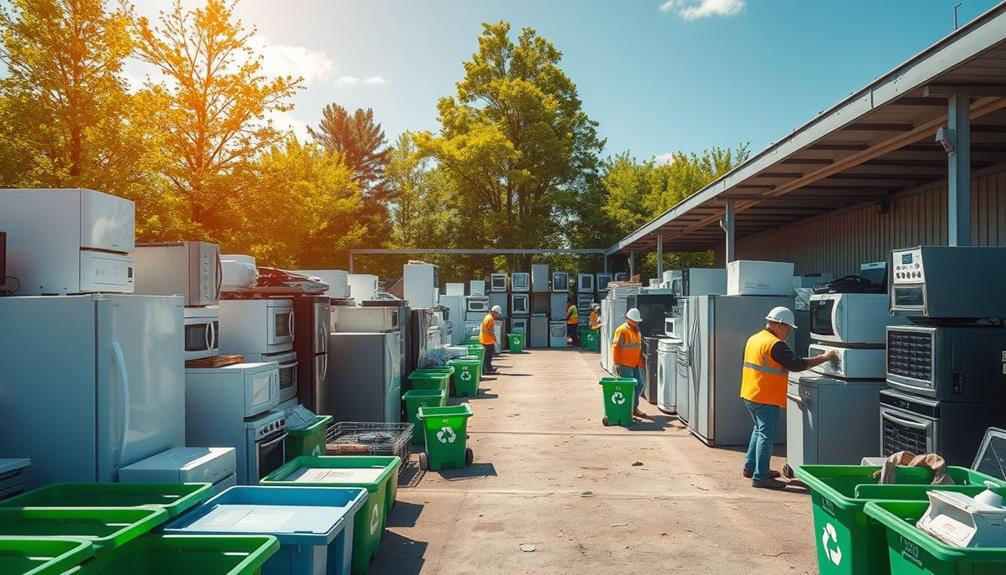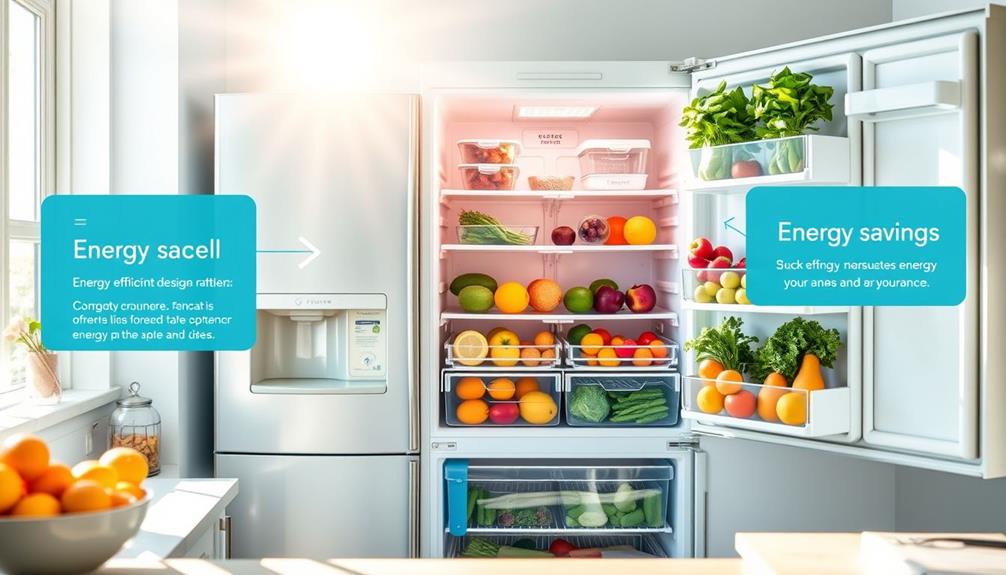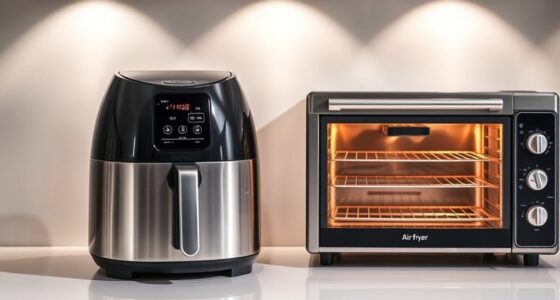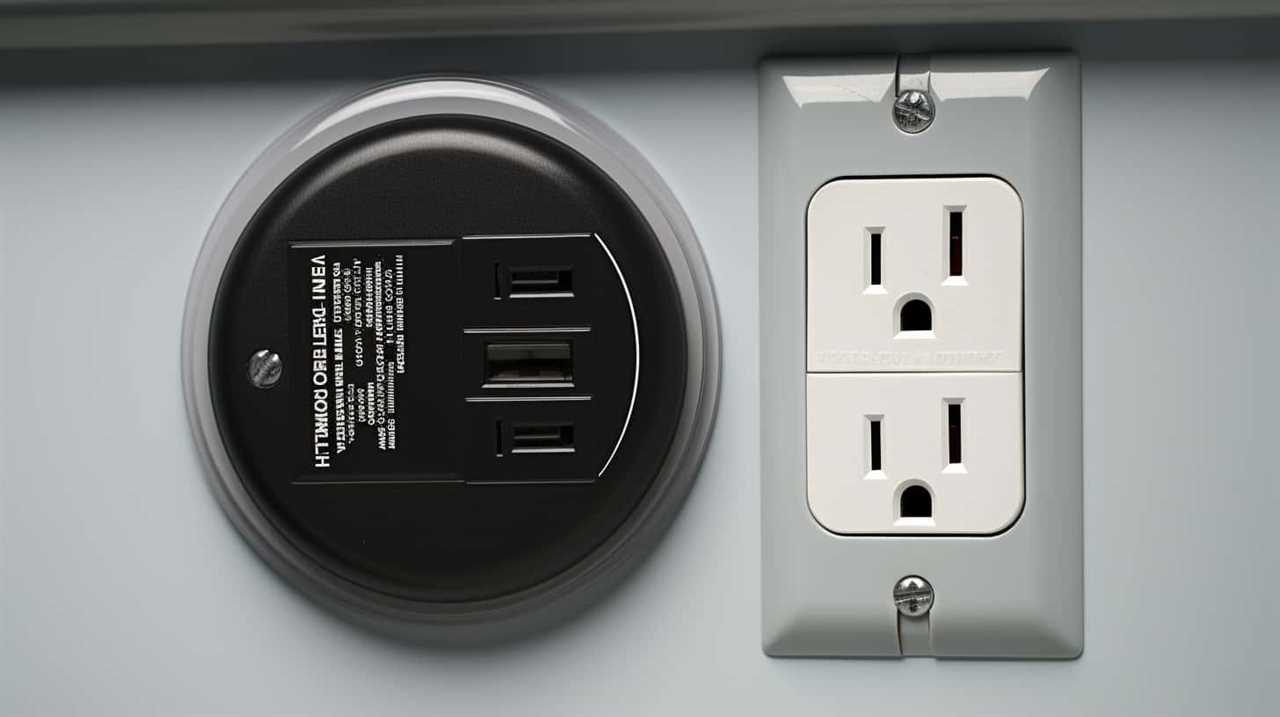To properly recycle old appliances, begin by unplugging them a few days in advance and securely taping doors shut to prevent accidents. Then, locate a licensed recycler specifically for items such as refrigerators, as they are equipped to handle hazardous materials safely. Reach out to local recycling centers or your utility company, as they often offer pickup services or incentives for recycling. If your appliance is still in working condition, consider donating it to organizations like Goodwill or Habitat for Humanity. Each action you take contributes to helping the environment, and there are numerous avenues to explore for responsible disposal. By taking these steps, you will uncover even more ways to make a positive impact.
Key Takeaways
- Unplug appliances several days before disposal and tape doors shut to ensure safety during transport.
- Use a licensed recycler for Freon removal from refrigerators, as improper disposal is illegal.
- Check local recycling centers or retailer programs for convenient and environmentally-friendly appliance recycling options.
- Consider donating working appliances to charities like Goodwill or Habitat for Humanity to help local communities.
- Ensure hazardous materials are handled correctly to prevent environmental pollutants from entering ecosystems.
Understanding Appliance Recycling
When it comes to recycling old appliances, understanding the process is vital for making environmentally responsible choices. You have various appliance recycling options that can greatly reduce landfill waste and recover valuable materials. About 75% of an average appliance's weight consists of recyclable steel, which plays an important role in the U.S. steel recycling market.
Additionally, many older appliances, like garage door openers, can be recycled to recover valuable components, enhancing the sustainability of your home. By opting for recycling, you're not just getting rid of your old appliances; you're actively participating in the Environmental Benefits of Recycling.
The EPA's Responsible Appliance Disposal (RAD) Program helps guarantee that hazardous materials, like refrigerants and heavy metals, are safely removed during the recycling process. This not only protects the environment but also promotes public health.
Many utility companies offer incentives for you to recycle old, energy-inefficient appliances, giving you a financial incentive while contributing to sustainability.
Specialized recycling facilities assess and dismantle appliances to maximize material recovery, adhering to strict environmental guidelines. When you choose to recycle, you're making a conscious decision that benefits both the planet and your community.
Preparing Appliances for Disposal
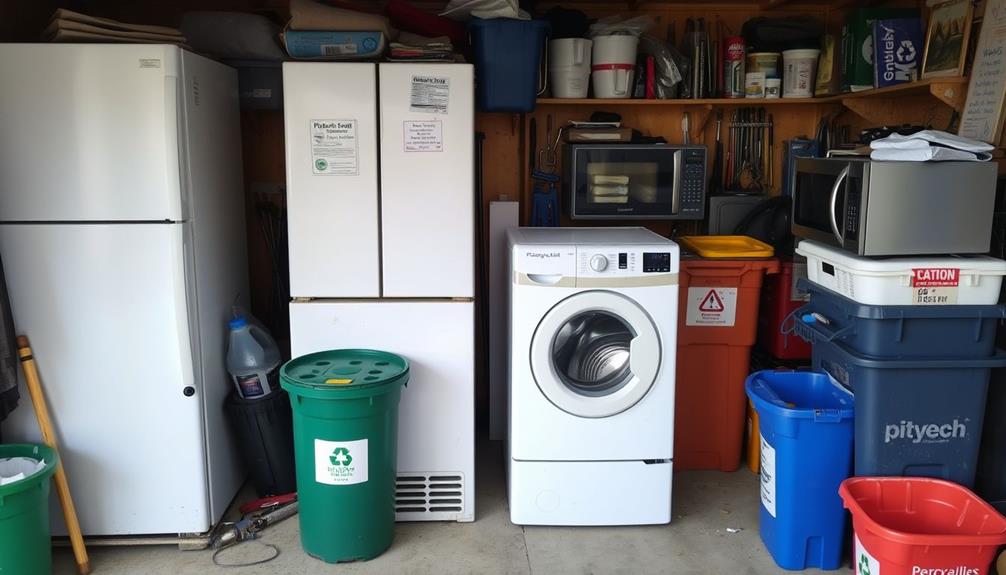
Recycling old appliances starts with proper preparation for disposal. First, unplug the appliance several days in advance to guarantee it's completely cool, especially for refrigerators and air conditioners that may contain Freon.
It's vital to confirm that a licensed recycler will handle the removal of Freon from your old appliances since it's illegal to discard these items without proper procedures. Additionally, consider the environmental impact of your disposal methods; understanding key factors in choosing a home cleaning service can help you select eco-friendly options available in your area.
When preparing appliances for disposal, make sure to tape the doors shut using masking or duct tape. This prevents accidental openings during transport, guaranteeing safety for both you and those handling the appliance.
If you plan to donate instead of recycle appliances, verify the appliance is in working condition. Check the acceptance guidelines and any pickup services offered by your chosen charity to make the process smoother.
Local Recycling Options
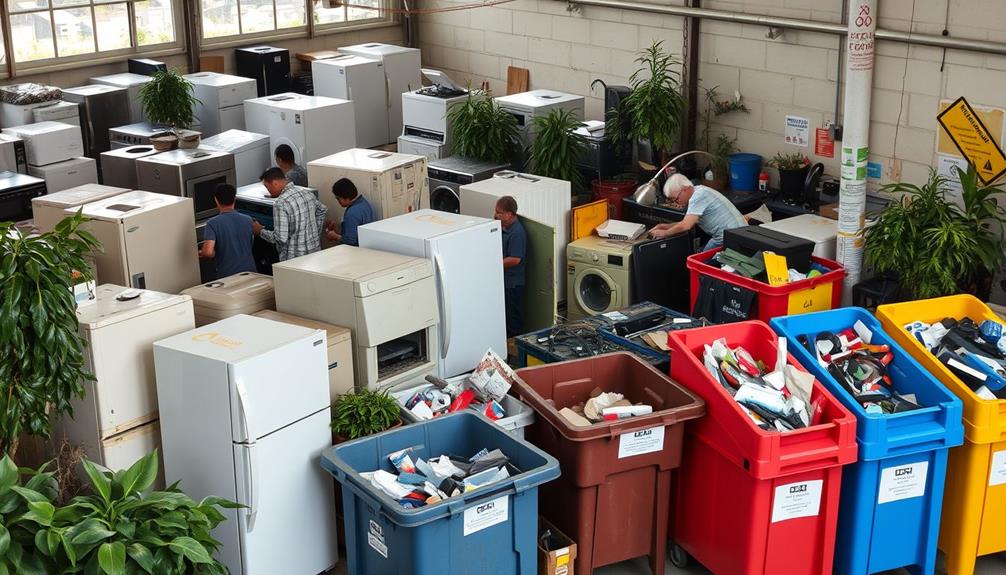
Finding the right local recycling options for your old appliances can make a significant difference in ensuring they're disposed of responsibly. Many appliances can release harmful pollutants if not recycled properly, making it essential to follow appropriate disposal methods. Here are some excellent choices to contemplate:
1. Recycling Centers: In Houston, you can find dedicated recycling centers that accept broken appliances. Metal recyclers are great for reclaiming valuable materials, ensuring they don't end up in landfills.
Additionally, using appliances that improve air quality, like ozone air purifiers, can enhance your indoor environment while you prepare for recycling.
2. City Depository Centers: The City of Houston offers neighborhood depository centers that accept large appliances. These centers follow proper disposal methods, giving you peace of mind that your appliance is recycled correctly.
3. Retailer Programs: Local retailers like Best Buy often have appliance recycling programs. If you're buying a new appliance, check if they'll take your old one—fees may apply, but it's a convenient option.
For an eco-friendly approach, contemplate the EPA's Responsible Appliance Disposal (RAD) program. This initiative partners with local services to guarantee safe and environmentally-friendly recycling practices.
Donation Opportunities
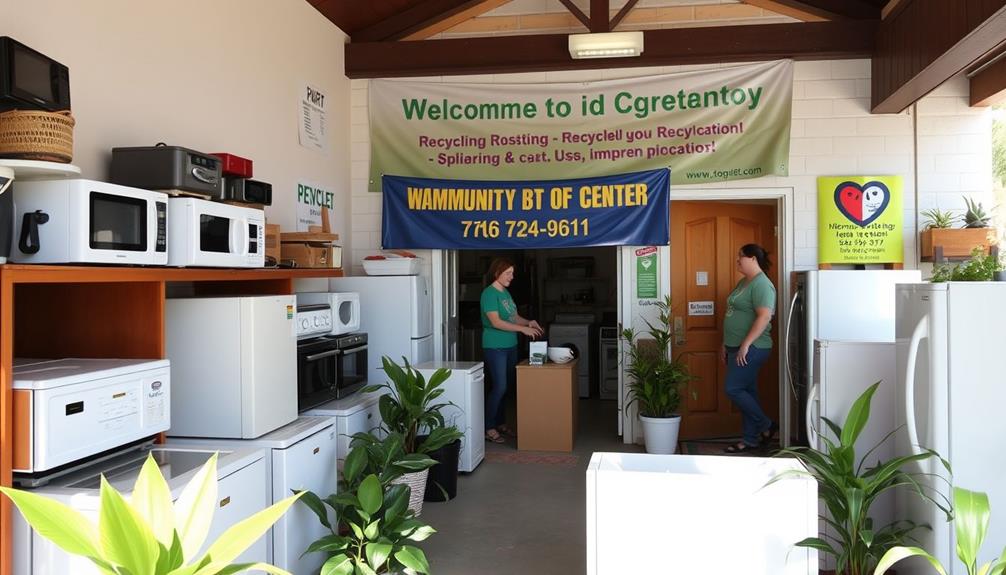
Donating your old appliances not only helps others but also reduces waste and supports local charities. If your appliance is still in good working condition, consider reaching out to organizations like Goodwill and the Salvation Army. They accept working appliances for resale, providing a convenient option for donating items while helping those in need.
Additionally, promoting adoption efforts for pets, such as dog breeds available for adoption, aligns with the spirit of giving back to the community.
Another great choice is Habitat for Humanity, which accepts appliance donations to support home improvement projects for families in your community. By donating, you're enhancing community welfare and making a real difference.
You can also use Donation Town, a resource that connects you with local charities for convenient appliance pickup. This simplifies the donation process and makes it easier for you to give back.
Additionally, the Vietnam Veterans of America accepts appliance donations to support veterans, allowing you to benefit those in your community while reducing waste.
Many charities offer pickup services, so you don't have to worry about transporting your donated appliance yourself. Whether you choose to support veterans or families in need, donating your appliances is a meaningful way to contribute to your community.
Manufacturer and Retailer Programs

When it comes to getting rid of old appliances, many manufacturers and retailers offer programs that make the process easier and more responsible. Participating in these manufacturer and retailer programs not only simplifies disposal but also guarantees that appliances are recycled properly.
Additionally, some appliances, like gas water heaters, can be safely disposed of through these programs as they often operate independently of power, gas appliances and power outages guaranteeing that hazardous materials are handled correctly.
- Manufacturer Programs: Many companies, like Electrolux and General Electric, are part of the EPA's Responsible Appliance Disposal (RAD) program. They focus on safe disposal and recycling services, guaranteeing hazardous materials are handled correctly.
- Retailer Take-Back Options: When you purchase a new appliance, many retailers provide take-back programs. This allows you to schedule the removal of your old unit, often at no extra cost. Major retailers like Best Buy have dedicated recycling programs to facilitate this.
- Utility Incentives: Some utility companies offer cash incentives for recycling energy-inefficient appliances. This not only promotes sustainability but also saves you money.
Environmental Benefits of Recycling
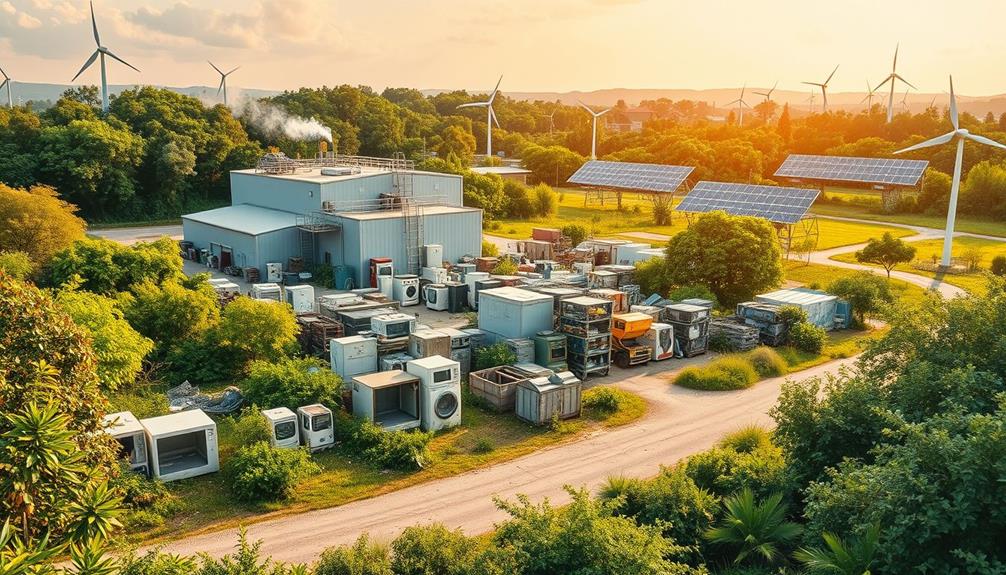
Recycling old appliances offers impressive environmental benefits that extend far beyond just clearing out clutter. When you recycle, you're not just making space; you're greatly reducing landfill waste. In fact, only 10% of U.S. steel recycling comes from appliances, yet each appliance contributes to the circular economy by reusing valuable materials.
Furthermore, as energy-efficient models become more prevalent, recycling older appliances can help reduce overall energy consumption in homes, aligning with eco-friendly innovations that promote sustainability.
Proper recycling processes also play an essential role in mitigating the release of hazardous materials. Substances like mercury and CFCs can be harmful to both the environment and human health. By ensuring these materials are handled correctly, you help protect ecosystems and communities.
Additionally, recycling helps conserve natural resources. For instance, recycling one ton of steel saves 2,500 pounds of iron ore, 1,400 pounds of coal, and 120 pounds of limestone. This conservation effort not only preserves our planet but also lowers greenhouse gas emissions associated with the production of new appliances.
Initiatives like the EPA's Responsible Appliance Disposal Program highlight the positive impact of recycling, having diverted over 1.06 billion pounds of ferrous metals and reduced environmental pollutants.
Common Recycling Questions

You might've several questions about how to properly recycle your old appliances after learning about their environmental benefits.
Understanding the importance of proper disposal can also tie into your efforts to live sustainably, especially as you consider how to enhance your DIY Power Sources for a more self-sufficient lifestyle.
Here are some common queries to help you navigate the process:
1. Do I need to schedule a pickup?
Many local recycling programs don't accept large electronics in curbside collections. You'll likely need to arrange for a special bulky waste pickup.
2. What about Freon removal?
Refrigerators require licensed professionals for Freon removal before you can recycle them. DIY removal is illegal and harmful to the environment, so don't skip this step.
3. How do I handle heavy appliances?
Washers and dryers have great recycling value, but their weight can make transportation tricky. Some local services offer pickup options to ease the burden.
When you're ready to recycle your old appliances, remember that the potential earnings can vary based on type and condition.
Factor in Freon removal costs, as they can impact your profits.
Frequently Asked Questions
How Do I Get Rid of Appliances Near Me?
To get rid of appliances near you, check local waste management for pickup options, research nearby recycling centers, consider retailer programs when buying new, or donate to charities that accept functional items.
Can I Put Small Electrical Items in the Recycle Bin?
You can't put small electrical items in the recycle bin. They contain complex materials and hazardous components that require special handling. Check local guidelines or e-waste centers for proper disposal options instead.
How to Get Rid of a Refrigerator in Houston?
Did you know that about 9 million refrigerators are disposed of improperly each year? To get rid of yours in Houston, contact a licensed professional for Freon removal and take it to a depository center.
How to Dispose of Small Appliances in Los Angeles?
To dispose of small appliances in Los Angeles, you can drop them off at designated recycling centers, schedule curbside pickup, or donate to Goodwill and The Salvation Army. Retailers like Best Buy also offer recycling options.
Conclusion
When you recycle your old appliances, you're not just clearing out clutter; you're giving them a second life, like a phoenix rising from the ashes. Every fridge, washer, or microwave you properly dispose of helps reduce waste and protects our planet's precious resources. So, roll up your sleeves, explore your local options, and let your old appliances transform into something new. Together, we can turn yesterday's junk into tomorrow's treasures, one appliance at a time!
